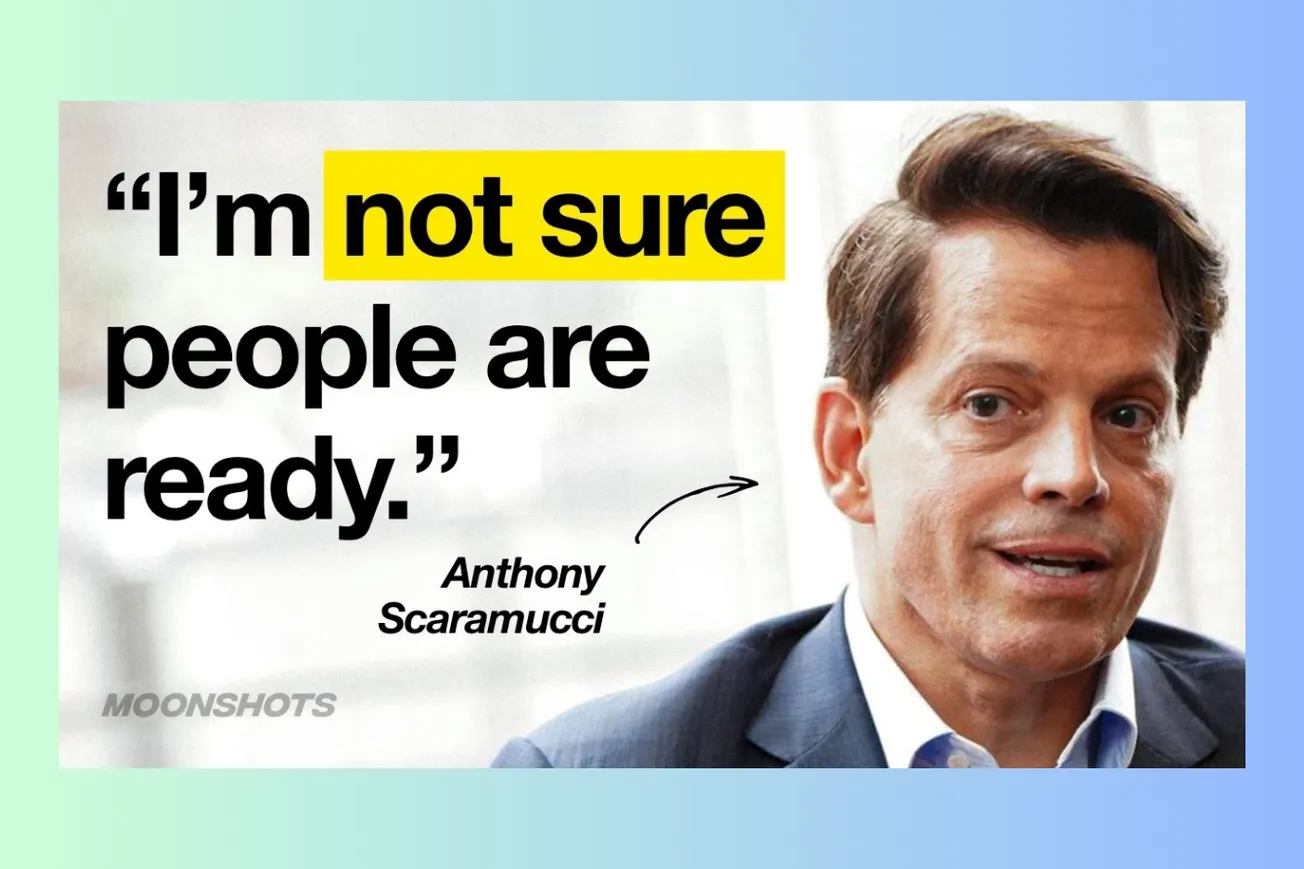Table of Contents
Peter Diamandis explores the Trump administration's technology agenda with Anthony Scaramucci and Salim Ismail, covering DOGE efficiency efforts and Bitcoin's trajectory.
Key Takeaways
- Elon Musk's government efficiency role faces Washington's institutional resistance and Trump's spotlight-sharing challenges
- Bitcoin adoption accelerates as institutional investors and sovereign nations build strategic reserves
- Constitutional amendments targeting Citizens United and gerrymandering could reshape technology policy landscape
- RFK Jr.'s health reforms may trigger massive deregulation wave across biotech and food industries
- America's technological edge depends on attracting global talent while maintaining constitutional protections
- The next four years could deliver a "Roaring 20s" renaissance if deregulation unleashes innovation
- Government debt crisis requires structural reforms beyond simple budget cuts to avoid economic collapse
- Technology deflation creates unique challenges for traditional debt-based economic models
- Free speech protections remain fundamental to America's innovation advantage over authoritarian competitors
Elon Musk's Washington Reality Check
- Anthony Scaramucci measures political survival in "scaramucci" units (11 days) and predicts Musk will last exactly 30 scaramuccis—330 days from inauguration
- Washington's "immunological system" systematically eliminates outsiders through opposition research, security clearance grinding, asset divestiture requirements, or direct confrontation tactics
- Trump paired Musk with Vivek Ramaswamy as a deliberate move to diminish both figures, since "they're not equals" despite public appearances suggesting otherwise
- The Department of Government Efficiency isn't actually a department and would require Congressional approval to become official, creating bureaucratic obstacles from day one
- Trump's "inverse Reagan" psychology means he takes all credit while ensuring subordinates remain in supporting roles, creating inevitable conflict with high-profile entrepreneurs
- Musk's existing commercial wealth ($300+ billion) provides some protection, but Trump has previously "eviscerated" Musk on social media when political allegiances shifted
The $2 Trillion Budget Cut Reality
- Scaramucci argues cutting $2 trillion from the $6.7 trillion federal budget would trigger "colossal economic collapse" rather than sustainable efficiency gains
- Historical precedent shows 14 years of austerity in Britain weakened the country significantly, while Reagan and FDR understood government spending's economic stabilization role
- Pay-as-you-go legislation from the Bush Sr. era offers a proven framework: tax cuts require spending cuts, new spending requires tax increases
- Clinton's adherence to pay-as-you-go rules generated a $240 billion surplus by his term's end, with CBO projecting $5 trillion surplus by 2010
- The current deficit trajectory began when Bush Jr. cut taxes in March 2001 then went to war in October—first time in US history combining war with tax cuts
- Controlled deficit reduction over 15 years through reinstated guardrails could work, but dramatic cuts would paralyze essential government functions protecting society's "bottom rungs"
Constitutional Surgery for Digital Age
- America operates on a 250-year-old "operating system" that hasn't seen significant amendments since the 1965 Civil Rights Act—59 years without major updates
- Citizens United decision created "separate but equal democracy" where corporate money dominates congressional decision-making over constituent interests
- Gerrymandering produces congressional districts resembling "jigsaw puzzle nonsense" rather than recognizable geometric shapes, protecting extremists and long-tenured representatives
- The founders intended constitutional amendments every eight years, not multi-decade stagnation that leaves the system vulnerable to technological and social disruption
- Technology deflation creates unprecedented challenges for debt-based economics—borrowing $10 million for TV manufacturing yields assets worth half their value within a year
- Free speech protections in the First Amendment directly drive innovation because "we teach our second graders to speak and think freely," creating entrepreneurs who develop transformative technologies
Bitcoin's Institutional Avalanche
- Bitcoin reached $94,000 during the conversation, with Cathie Wood predicting $650,000 base case and $1.5 million bull case by 2030
- Michael Saylor's conversion story illustrates the "arbitrage on intellect"—calling Bitcoin "a joke" in 2016-2017, then becoming unable to sleep once he understood the technology
- Global millionaire math creates scarcity pressure: 60 million millionaires worldwide versus roughly 15 million available Bitcoin (assuming 4 million permanently lost)
- Pennsylvania House introduced strategic Bitcoin reserve legislation, with Wisconsin already allocating $150 million to BlackRock's Bitcoin ETF as precedent
- The "Great Wall Street Sales Machine" will drive adoption through "Legions of financial advisers" creating PowerPoint presentations to move institutional investors "off zero"
- Gary Gensler's regulatory suppression delayed Bitcoin adoption by years, with current prices reflecting where markets should have been in January 2022
Healthcare Revolution Under RFK Jr.
- RFK Jr.'s three-decade track record fighting corporate interests positions him to tackle regulatory capture across food and pharmaceutical industries
- American food system dysfunction becomes apparent when traveling—eating identical foods in Greece or Italy causes weight loss while US versions cause weight gain due to preservatives
- Returning to 1991 obesity levels would save approximately $2 trillion in healthcare expenses, dwarfing proposed government efficiency cuts
- Citizens United enables "big food" and "big pharma" to corrupt congressional decision-making through campaign contributions, blocking meaningful reform
- FDA's revolving door problem exemplified by officials joining pharmaceutical companies after blocking competitors like MDMA therapy or stem cell treatments
- Michelle Obama's 2009-2010 food safety initiative faced industry backlash including conspiracy theories and dehumanizing attacks, forcing the administration to retreat from reforms
The Trump administration's technology agenda represents either America's greatest innovation opportunity in decades or a collision course with entrenched interests that have captured regulatory systems. Success depends on maintaining constitutional protections while updating frameworks for digital-age realities.





